This election year, why not opt for rose-tinted glasses?
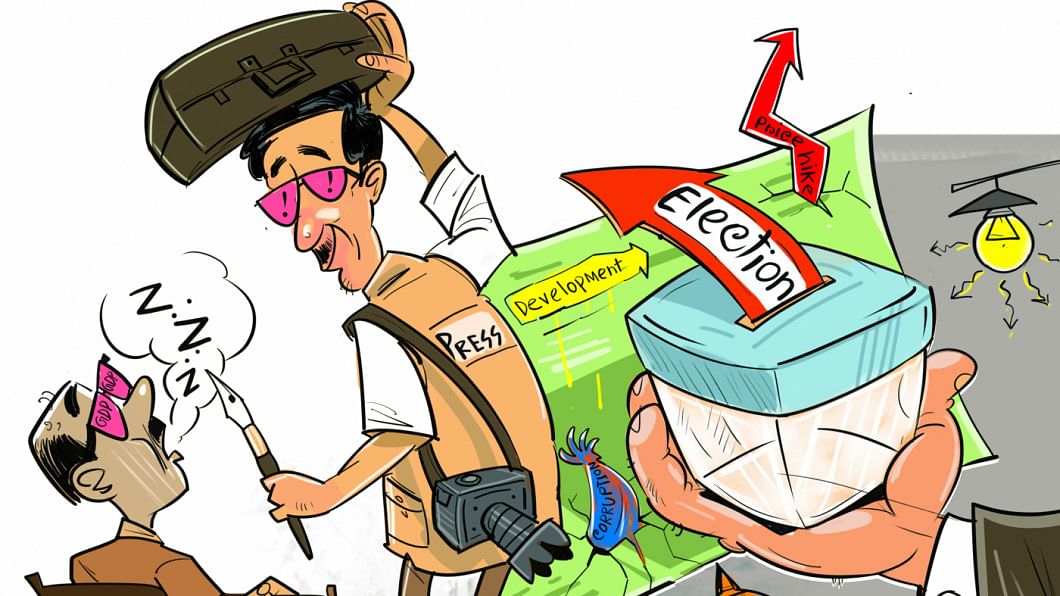
The media should take a sabbatical this election year. Everyone knows what happens when elections are coming up. It is only natural that the party in government will want the media to put on those rose-tinted glasses and focus on the "phenomenal" achievements in taking the country forward – the shiny new bridges, metro rail that will even have underground routes just like in London, the magnanimous amounts of money poured into social safety net programmes, the abundant food reserves, the unprecedented empowerment of women (just look at the number of women in parliament, in the garment sector, in the banks, NGOs), the unprecedented remittance flows and RMG exports, and our glorious strides into the digital, smart stage of development. And why not? Most of these things are true – there is no need to really dig deep to find dirt. Just stay on the surface and all will be well.
So it's a little mean when, instead of appreciating the fact that we have electricity in Dhaka city – practically all the time, especially in the areas where there are English newspaper readers – we bemoan that our relatives in the villages have forgotten what it's like to have continuous electricity throughout the night, that it makes a guest appearance only for a few hours, if at all. Are these people starving? Are their children not going to school? Are there not leafy trees even after massive deforestation and ponds to cool off in even after all the major rivers have been encroached upon and dumped with garbage? Do they not know what a "hurricane lamp" is? And is it not true that practically everyone has a smartphone these days – especially the young ones who can use TikTok and Imo to their hearts' content, as long as they remember to charge their phones during the short stints of power supply?
Plus, it's a good thing that people in rural areas don't stay up late watching TV. Villagers have a million different things to do in the morning – they need to get up early and go to the fields, prepare the grains to ensure that the rest of us are fed. They can't tire themselves out watching rubbish on the tube – well, alright, maybe a little BTV news on the unbelievable accomplishments of the government. The media should focus on the gleaming grins of the farmers as they harvest high yields, not their whining about the low prices they will have to sell their crops for that barely cover the production costs.
It's a question of seeing the cup half full or half empty. Journalists who take their profession too seriously will incorrigibly choose the latter perspective. It's not just that bad news sells better, it's because journalists are a bitter lot and are out to be killjoys of any party, especially the ruling one. So they will keep talking about the sorry state of public hospitals, the 51 percent of girls marrying before 18 and dropping out of school, the lack of teachers in government schools, the increasing costs of megaprojects, the broken roads, dilapidated buses, lack of jobs for the youth, "inefficiencies and anomalies" in various public service sectors. The tirade never ends.
They will harp on about workers in the garment factories not getting minimum wages and how they cannot cope with the spiralling prices of essentials and healthcare. Don't they realise how important this sector is – that Bangladesh exported garment products worth over $42 BILLION in the last fiscal year? On second thought, that may be a little counter-intuitive …
Basically, instead of looking at the RMG miracle, they will focus on nit-picking on living wages, non-payment of Eid bonuses, unpaid arrears of wages, and so on.
There is also this tendency to talk to "experts" for every little thing and rely on data for every little observation, which is a reflection of this unnecessary negativity. So, instead of focusing on the government providing Tk 500 each to a whopping 5.7 million elderly people and 2.5 million widows under its social safety net programmes, they will rain on even this parade by talking about 30 percent of the elderly and 33 percent of widows who are ineligible beneficiaries, with 12 percent of the beneficiaries getting multiple allowances.
Such "think tanks" have the audacity to suggest increasing the allowances (of what they think are eligible beneficiaries) from Tk 500 to Tk 2,500 in view of the rise in prices of essentials! As if all those extra crores needed to cover this will just magically "appear" like the crores of taka from local bank loans fattening up accounts in banks in Singapore, Switzerland, Canada or Dubai.
By the way, during an election year, is it really necessary to bring up the Digital Security Act (DSA) so many times? Yes, it is a bit draconian, has been misused and led to many people going to jail, even being tortured, some of them being journalists. But what did they expect? How can a government trying so hard to change the trajectory of a country, towards an ascending economic growth and eye-catching infrastructural development – at least in the eyes of the relevant public and the world – allow people to just say what they like and have their own opinions? This is election year, you dummies; can't you just keep your opinions, your fact-based reporting to yourselves and avoid them going viral on social media? Can't you exercise a bit of restraint and wear those rose-tinted glasses that many of your smart friends have chosen?
Aasha Mehreen Amin is joint editor at The Daily Star.

 For all latest news, follow The Daily Star's Google News channel.
For all latest news, follow The Daily Star's Google News channel. 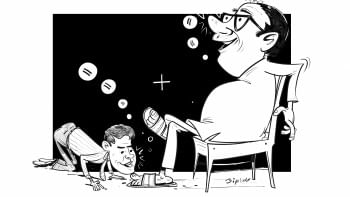
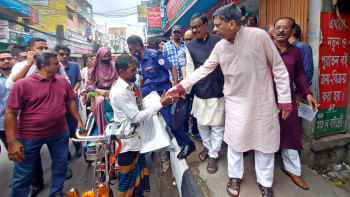



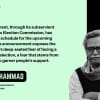
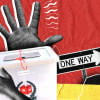
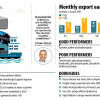



Comments